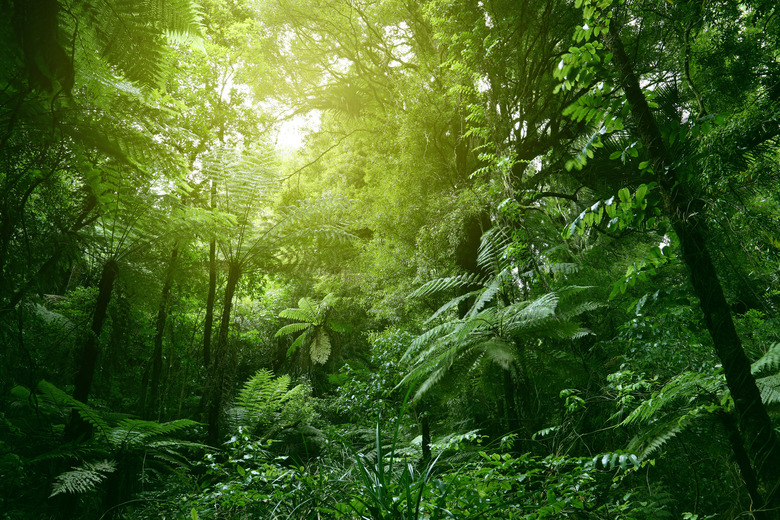List Of Bacteria In The Temperate Deciduous Forest
A temperate deciduous forest ("four-season forest") is an area with an average temperature of about 50 degrees F and where rainfall ranges between 30 and 60 inches per year. Over the course of a year, the weather may range from cold with moderate amounts of snow to warm and rainy. These areas are found in several parts of the world, including the eastern third of North America, western Europe, China, Japan and Australia. Because of their moderate temperatures and other factors, these are ideal places for certain types of bacteria.
Bacillus subtilis
Bacillus subtilis
Bacillus subtilis is an organism commonly found in hay and grass. This particular member of the Bacillus genus is capable of living in extreme environmental conditions and needs little more than oxygen to survive. The subtilis is rod-shaped and has the ability to form a protective exterior, called an endospore, which increases its resistance to heat and cold. B. subtilis does not affect humans (it is nonpathogenic), but may contaminate some food sources. Though it does not cause poisoning, it is responsible for causing the sticky, stringy feeling of spoiled bread dough. In a temperate forest setting, B. subtilis will most commonly be found in grass and rotting plant material, particularly in damp, dark areas.
Enterobacter agglomerans
Enterobacter agglomerans
Once considered unimportant in the medical world, Enterobacter agglomerans was discovered in the mid-1960s to cause certain forms of pneumonia. Additionally, this particular type of bacteria also causes wound infections and urinary tract infections. An opportunistic infection, it can also be found outdoors in temperate climates. The species is generally a plant pathogen, and can be found in fecal matter, on plants and in soil. The bacteria are gram-negative and require oxygen and moisture to reproduce. Exposure to this type of bacteria will commonly cause an immediate immune response, which leads to pain and swelling of the inflicted area. The areas most often infected are bones and joints or soft tissue.
Escherichia Coli
Escherichia Coli
Perhaps one of the best known members of the bacteria family, Escherichia Coli (E. Coli) is a naturally occurring bacterium that lives in the lower digestive tract of warm-blooded animals. Only a few strands are harmful, and these strains have been known to cause severe illness in humans. It can be found living on the forest floor due to the activities of the warm-blooded animals that inhabit temperate areas. Deer, bear, raccoons and squirrels are just a few of the carriers of E. Coli. Generally helpful to humans, E. Coli produces vitamin K and helps to eliminate more harmful bacteria. E. Coli does not live long outside the body, but it is capable of withstanding extreme conditions and can survive with or without oxygen.
References
Cite This Article
MLA
John, Sara. "List Of Bacteria In The Temperate Deciduous Forest" sciencing.com, https://www.sciencing.com/list-of-bacteria-in-the-temperate-deciduous-forest-12407087/. 22 November 2019.
APA
John, Sara. (2019, November 22). List Of Bacteria In The Temperate Deciduous Forest. sciencing.com. Retrieved from https://www.sciencing.com/list-of-bacteria-in-the-temperate-deciduous-forest-12407087/
Chicago
John, Sara. List Of Bacteria In The Temperate Deciduous Forest last modified August 30, 2022. https://www.sciencing.com/list-of-bacteria-in-the-temperate-deciduous-forest-12407087/
